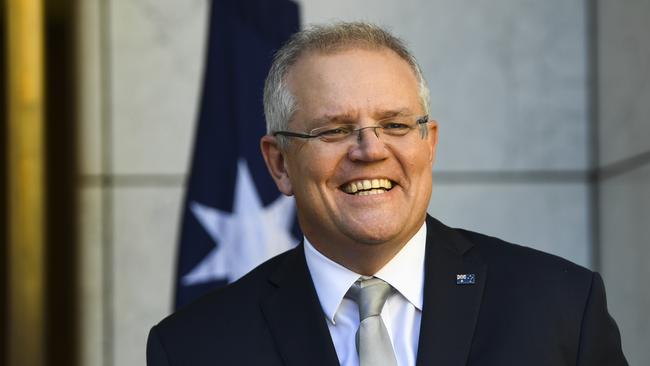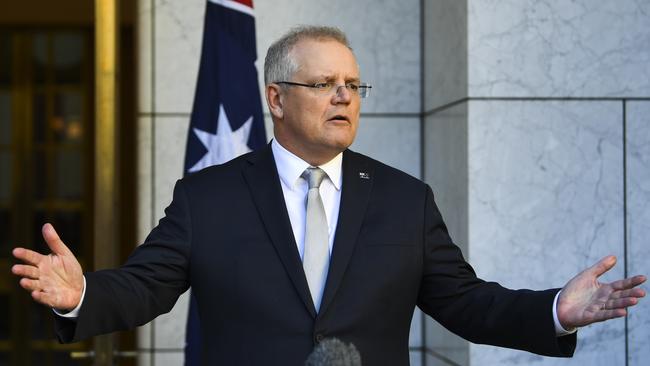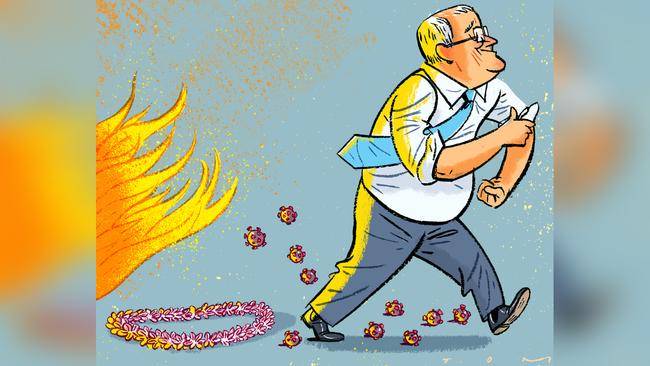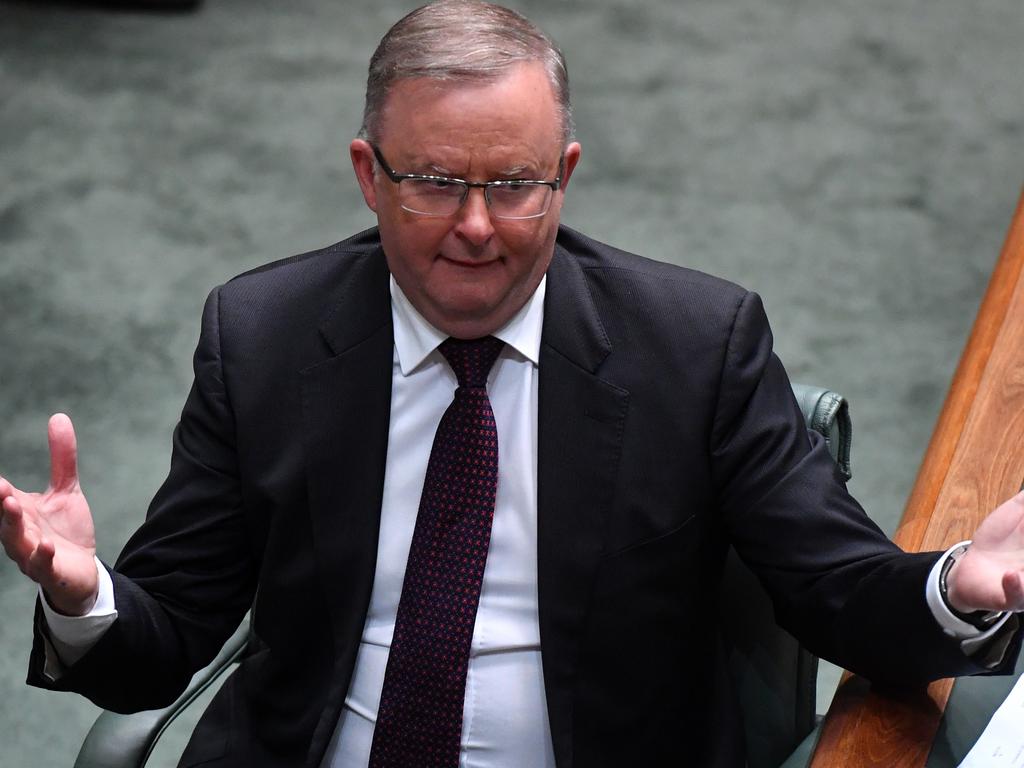Why the PM gets an A+ and has the election almost in the bag
In a time of global crisis, the Prime Minister has grown into the role — even his harshest critics must concede that. There’s no denying his dominance.

Scott Morrison wins if he successfully manages Australia out of the economic crisis caused by COVID-19. If the economic fallout gets away from the government and mismanagement rears its ugly head, Morrison still wins off the back of a scare campaign warning voters not to risk turning to Labor in a time of crisis, using the Coalition’s dominance on economic management as revealed consistently by the polls.
That catch-22 may be a factor preventing Anthony Albanese taking up residence in the Lodge.
But there is no denying the successful way Morrison and the Coalition have responded to the COVID crisis; indeed, there is no denying Morrison’s political successes since he assumed the prime ministership.
Not all political leaders can take advantage of circumstances, even those in their favour. So far, Morrison’s skills suggest he can.
Yes, there have been problems along the way. Before COVID-19 hitting, Morrison appeared to be on a downward trajectory courtesy of his botched response to the bushfires and the lingering taint of the sports rorts affair. In that context, the gigantic blunder on robodebt could have been enough to bring his government to its knees.
But not now. Morrison has grown into the role of Prime Minister; even his harshest critics must concede that.
John Howard, once comfortable in the job, still presided over a litany of scandals. However, Howard’s political acumen allowed him to pivot past them and maintain his dominance. Morrison looks set to do the same, and much earlier into his tenure than Howard. Morrison’s successes to date are all the more remarkable in the context of the previous 12-plus years in Australian politics.

No prime minister since Howard has managed to serve out a full term in office, much less do so and win the subsequent election.
If Morrison breaks that drought, he’ll have done so carrying his colleagues over the line for a fourth Coalition term in office after close to nine years in power, even though he has been Prime Minister only since August 2018.
From Kevin Rudd to Julia Gillard, back to Rudd, to Tony Abbott and on to Malcolm Turnbull, none learned from their mistakes. Each learned nothing and forgot nothing, contributing to their collective failures in staying in office.
Prime ministers need both to win elections and achieve policy outcomes. Morrison has yet to substantially prove himself on the latter scorecard. But he is on his way, and has been in the job for less than two years.
It is easy to forget, for example, the sizeable income tax cuts passed through the parliament immediately after the “miracle” election win last year. As many as 94 per cent of taxpayers soon will have a top marginal tax rate of 30 per cent. While I may have reservations about such a flat income tax structure, moving towards that outcome is in the DNA of Liberals.
Morrison is therefore servicing their ideological needs.
But not at the expense of managing the COVID crisis. JobSeeker and JobKeeper aren’t the sort of policy scripts Liberals gravitate towards.

Yet Morrison introduced both relatively swiftly, breaking from the conservative economic tradition of letting the market rip even in a time of crisis, which would have seen unemployment skyrocket well into double digits, as it has in other parts of the world, rather than the current 7.1 per cent. Morrison was prepared to throw fiscal caution to the wind to save people’s livelihoods.
Doubling the Newstart rate for JobSeeker has cushioned the impact of unemployment for hundreds of thousands of Australians who are experiencing it for the first time. And extending the increase to those who were already unemployed has allowed them to improve their impoverished state in meaningful ways during this crisis while providing vital economic stimulus via their new-found spending capacity.
Yes, we know there are plans to wind back JobSeeker and JobKeeper come September. And workers have missed out on JobKeeper for threadbare reasons.
But there are clear indications selective industries will see a version of JobKeeper extended, and the old Newstart rate will be lifted, for the first time since 1994, even if it’s well short of the current JobSeeker payments.
But for a Liberal prime minister, that is as it should be.
Morrison is finding the balance between his ideological right flank, which quite frankly is heartless, and his left-wing critics, who would spend more than Liberals are comfortable with, as Labor did after the global financial crisis, well after the crisis had passed.
It is a pragmatic balancing act and one Morrison is managing successfully so far.
Former political commentator Laurie Oakes once said of Howard that he had made every mistake in politics, but only once.
Morrison is showing all the indications of similar political learning. He even is putting his predilection for combative media performances behind him, which in time will unite more mainstream Australians behind him and against interviewers asking loaded questions. Howard made a similar transformation from his first stint as opposition leader to his successful era as prime minister. And “Howard’s battlers” rallied around him.
We will be able to properly judge Morrison’s prime ministership only once it is over, or close enough to, neither of which is on the horizon for now courtesy of his performance. That was also the case with Howard.
Imagine judging Howard’s prime ministership less than two years into it: way down in the polls, and substantially so.
Howard was deeply unpopular personally and, despite winning a thumping majority in 1996, he was staring down the barrel of losing his first attempt at re-election, his first-term government having been beset by scandals and losing a handful of ministers.
Comparatively speaking Morrison is flying, and doing so during the deepest recession this country looks set to face since the Depression. He may be the first prime minister to preside over a recession in 29 years, but we can hardly blame Morrison for that. The entire world is in recession.
In Morrison’s short tenure as Prime Minister, he has won an election few thought he would (me included), and he has presided over Australia managing the COVID-19 health crisis as well as any nation.
Now comes the economic recovery, and the task of reforming the economy to cope in the post-COVID world. These will be mammoth tasks that ultimately will affect Morrison’s legacy, how history judges him. For now he gets an A+, with a fourth Coalition term all but assured.
Peter van Onselen is a professor of politics and public policy at the University of Western Australia and Griffith University.





There is no denying the dominance of the Prime Minister at the moment, and it is hard to see that changing before the next election.